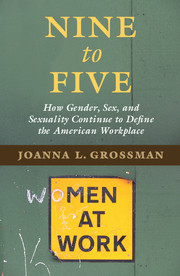Book contents
- Frontmatter
- Dedication
- Contents
- Foreword
- Acknowledgments
- Introduction
- PART I WHAT IS SEX DISCRIMINATION?
- 1 Sexual Jealousy
- 2 Too Hot to Be a Dental Hygienist?
- 3 A Twist on the Problem of Sex Inequality in Coaching
- 4 Mixed Motives
- 5 Sex Stereotyping and Dress Codes
- 6 A Victory for Transgender Employees
- 7 How Fast Must Female Transit Officers Run?
- 8 Who Is Protected by Antidiscrimination Laws?
- 9 Punishing the Coach Who Stood Up for His Female Athletes
- 10 Broader Protection against Workplace Retaliation
- 11 The Supreme Court Protects Retaliation Victims but Still Leaves Gaps in the Law
- PART II SEXUAL HARASSMENT
- PART III PREGNANT WOMEN AND MOTHERS AT WORK
- PART IV FEMALE BREADWINNERS AND THE GLASS CEILING
- Conclusion
- Notes
- Index
3 - A Twist on the Problem of Sex Inequality in Coaching
from PART I - WHAT IS SEX DISCRIMINATION?
Published online by Cambridge University Press: 05 May 2016
- Frontmatter
- Dedication
- Contents
- Foreword
- Acknowledgments
- Introduction
- PART I WHAT IS SEX DISCRIMINATION?
- 1 Sexual Jealousy
- 2 Too Hot to Be a Dental Hygienist?
- 3 A Twist on the Problem of Sex Inequality in Coaching
- 4 Mixed Motives
- 5 Sex Stereotyping and Dress Codes
- 6 A Victory for Transgender Employees
- 7 How Fast Must Female Transit Officers Run?
- 8 Who Is Protected by Antidiscrimination Laws?
- 9 Punishing the Coach Who Stood Up for His Female Athletes
- 10 Broader Protection against Workplace Retaliation
- 11 The Supreme Court Protects Retaliation Victims but Still Leaves Gaps in the Law
- PART II SEXUAL HARASSMENT
- PART III PREGNANT WOMEN AND MOTHERS AT WORK
- PART IV FEMALE BREADWINNERS AND THE GLASS CEILING
- Conclusion
- Notes
- Index
Summary
Andrew Medcalf, an assistant coach for the men's crew team at the University of Pennsylvania (“Penn”), with British National Championships to his name as both a rower and a coach, applied to be head coach for the school's women's crew team. He did not get the job, and a woman was hired instead. Medcalf then sued Penn, claiming the decision constituted sex discrimination in violation of Title VII of the Civil Rights Act of 1964. A federal jury found for Medcalf, awarding him $115,000 in damages.
Medcalf's claim of reverse discrimination is unusual, given that equality for female coaches in collegiate athletics has long been elusive. Given the evidence, the verdict for Medcalf may well have been the right one. But Medcalf's individual situation should not cause us to lose sight of the heart of inequality in coaching: discrimination against female coaches.
THE EVIDENCE AGAINST – AND FOR – PENN
According to the evidence introduced at trial, Medcalf was told by Penn's rowing director he was not hired – or even interviewed – because Penn wanted to hire a woman for the position. He charged that an assistant director of athletics told him, “We're going to get a woman at least as good as you, if not better.” There was some evidence that Penn preferred a woman because it was looking for a female role model for the female athletes. And the woman Penn did hire was by no means unqualified. Indeed, she came with substantial head coaching experience, both for Dartmouth College and the U.S. junior women's national team.
Nevertheless, the jury was instructed to return a verdict for Medcalf if they believed sex was a “determinative factor” in Penn's decision not to hire him. To understand why this instruction was given, some background in discrimination law is necessary.
THE TWO DEFENSES AGAINST CLAIMS OF SEX DISCRIMINATION IN HIRING
Title VII generally precludes employers from taking sex into account when making employment decisions, including decisions about hiring. There are only two exceptions to this rule. The first is for hiring decisions based on a bona fide occupational qualification (BFOQ). The second is for hiring decisions made pursuant to a valid affirmative action plan.
- Type
- Chapter
- Information
- Nine to FiveHow Gender, Sex, and Sexuality Continue to Define the American Workplace, pp. 17 - 21Publisher: Cambridge University PressPrint publication year: 2016



